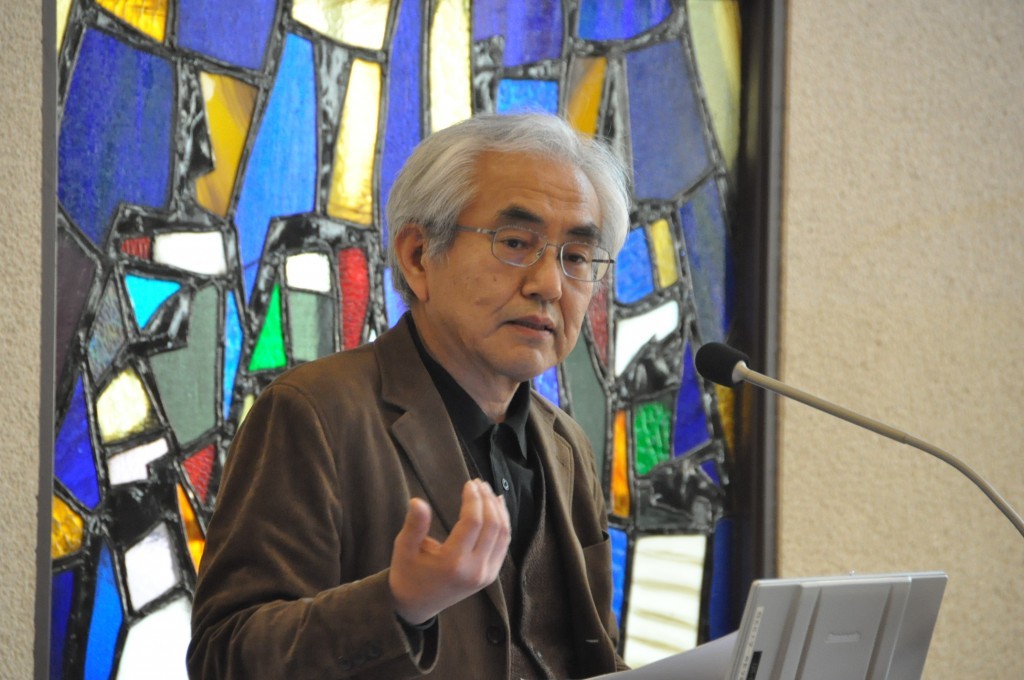Center for Interdisciplinary Study of Monotheistic Religions(CISMOR)Doshisha University
> Public Lectures > Exploring the Depths of IslamPublic Lectures
Exploring the Depths of Islam
| Date: |
2017/02/25 13:00-15:00 |
|---|---|
| Place: | Divinity Hall Chapel, Imadegawa Campus |
| Lecture: | Shigeru Kamada ( Emeritus professor of Tokyo University/ former-President of The Society for Near Eastern Studies in Japan) |
| Summary: | |
|
In this lecture entitled “Exploring the Depth of Islam,” the speaker discussed how one might consider the difference between monotheism and polytheism. In addition, by examining the trend of mysticism, the speaker hoped to provide a better understanding of Islam. It is often thought that monotheistic religions come into conflict with polytheistic ones. However, when one examines the various religions throughout the world, it becomes evident that this assumption creates misunderstandings. For example, if one examines Motoori Norinaga’s commentary on the Chronicles of Japan, gods are defined as beings whose powers exceed that of humans. Motoori writes that these deities excel in virtue and are to be feared. His ideas express the Japanese interpretation and understanding of polytheism. On the other hand, according to Christian theology, God is the transcendent being who created all living things as well as the universe. He also has the power and priority to “judge”. If one accepts the definition that beings who are greater than humans are gods, then Christian saints and angels would fit into the polytheistic category of a deity. If one judges other religious traditions based on the definitions of one’s own religion, the concepts of monotheism and polytheism would have to be altered significantly. Therefore, one needs to exercise care when comparing religions. In the case of Islam, God is almighty. This would fit into the category of monotheism. The exclusivity of God can be confirmed through the Islamic creed (Shahada) declaring the oneness of God. “There is no god but God. Muhammad is the messenger of God.” As the word Islam signifies submission, one is supposed to follow the divine master and the words of the prophet. To be a Muslim also involves special emphasis in reason and legalistic thinking. According to Prof. Kamada, the fact that God is one indicates that only God truly exists. This implies that all other things do not really exist. In other words, God is the divine master and people are simply His servants. This can also be perceived in another way: God and mankind are completely different entities. Because of these two states of existence, God becomes the creator of all things. If one accepts that only God exists, then this absolute being can be seen as spreading itself through all things in a state of true perfection. Naturally, that which is created can only manifest itself as less than perfect beings. Prof. Kamada also touched upon the idea that ultimately God and mankind can become one which was elaborated by poets and mystical thinkers such as Rabia (-801) Abū Yazīd Ṭayfūr al-Basṭāmī (-874) and Rumi (-1273). Prof. Kamada also explained Mulla Sadra’s (-1640) theory that existence precedes one’s essence. Through one’s essence, form can come into being. The state in which energy is overflowing throughout the world is analogous to the unified state before God created the universe‐when the creator and all other things are one. In this way, Islam puts much emphasis on following the word of God and at the same time as Sadra has pointed out, one needs to consider the perspective that God is one and only God truly exists. Exploring the depths of Islam involves coming into contact with individuals who theorize about the exclusive existence of God. Translated by Jonathan Augustine (Ryukoku University) |
|

